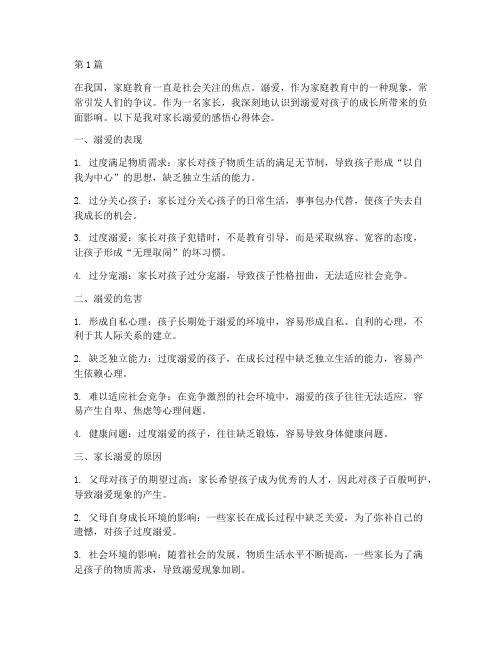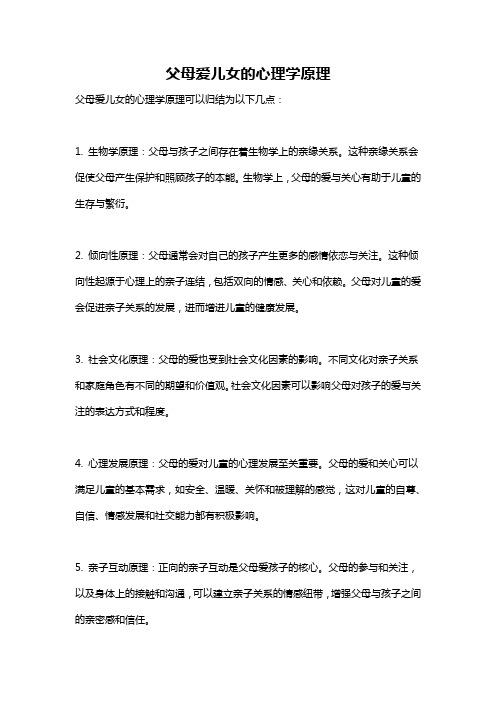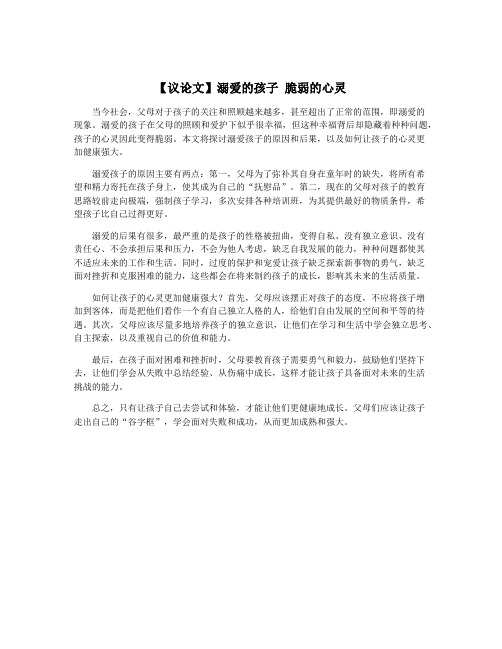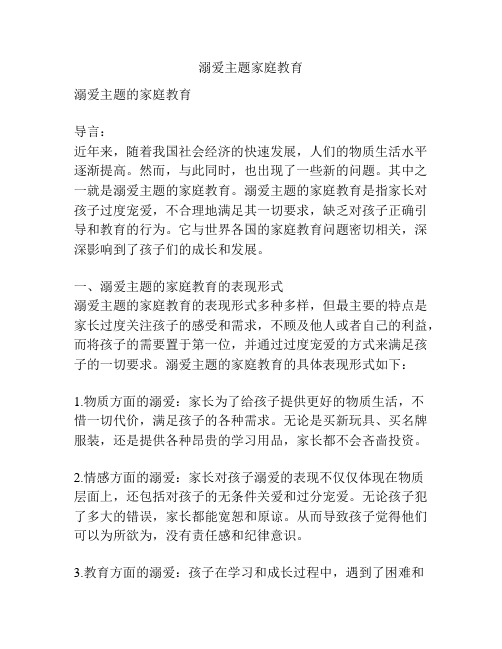【家长溺爱孩子的原因】家长溺爱幼儿的原因
家长溺爱感悟心得体会(3篇)

第1篇在我国,家庭教育一直是社会关注的焦点。
溺爱,作为家庭教育中的一种现象,常常引发人们的争议。
作为一名家长,我深刻地认识到溺爱对孩子的成长所带来的负面影响。
以下是我对家长溺爱的感悟心得体会。
一、溺爱的表现1. 过度满足物质需求:家长对孩子物质生活的满足无节制,导致孩子形成“以自我为中心”的思想,缺乏独立生活的能力。
2. 过分关心孩子:家长过分关心孩子的日常生活,事事包办代替,使孩子失去自我成长的机会。
3. 过度溺爱:家长对孩子犯错时,不是教育引导,而是采取纵容、宽容的态度,让孩子形成“无理取闹”的坏习惯。
4. 过分宠溺:家长对孩子过分宠溺,导致孩子性格扭曲,无法适应社会竞争。
二、溺爱的危害1. 形成自私心理:孩子长期处于溺爱的环境中,容易形成自私、自利的心理,不利于其人际关系的建立。
2. 缺乏独立能力:过度溺爱的孩子,在成长过程中缺乏独立生活的能力,容易产生依赖心理。
3. 难以适应社会竞争:在竞争激烈的社会环境中,溺爱的孩子往往无法适应,容易产生自卑、焦虑等心理问题。
4. 健康问题:过度溺爱的孩子,往往缺乏锻炼,容易导致身体健康问题。
三、家长溺爱的原因1. 父母对孩子的期望过高:家长希望孩子成为优秀的人才,因此对孩子百般呵护,导致溺爱现象的产生。
2. 父母自身成长环境的影响:一些家长在成长过程中缺乏关爱,为了弥补自己的遗憾,对孩子过度溺爱。
3. 社会环境的影响:随着社会的发展,物质生活水平不断提高,一些家长为了满足孩子的物质需求,导致溺爱现象加剧。
四、如何克服家长溺爱1. 树立正确的教育观念:家长要树立正确的教育观念,认识到溺爱对孩子的危害,注重培养孩子的独立能力和良好习惯。
2. 增强自身素质:家长要不断提高自身素质,学会科学教育孩子,为孩子树立良好的榜样。
3. 培养孩子的独立性:家长要让孩子学会独立思考、独立生活,培养其自主解决问题的能力。
4. 关注孩子的心理健康:家长要关注孩子的心理健康,及时发现并解决孩子在成长过程中遇到的问题。
父母爱儿女的心理学原理

父母爱儿女的心理学原理
父母爱儿女的心理学原理可以归结为以下几点:
1. 生物学原理:父母与孩子之间存在着生物学上的亲缘关系。
这种亲缘关系会促使父母产生保护和照顾孩子的本能。
生物学上,父母的爱与关心有助于儿童的生存与繁衍。
2. 倾向性原理:父母通常会对自己的孩子产生更多的感情依恋与关注。
这种倾向性起源于心理上的亲子连结,包括双向的情感、关心和依赖。
父母对儿童的爱会促进亲子关系的发展,进而增进儿童的健康发展。
3. 社会文化原理:父母的爱也受到社会文化因素的影响。
不同文化对亲子关系和家庭角色有不同的期望和价值观。
社会文化因素可以影响父母对孩子的爱与关注的表达方式和程度。
4. 心理发展原理:父母的爱对儿童的心理发展至关重要。
父母的爱和关心可以满足儿童的基本需求,如安全、温暖、关怀和被理解的感觉,这对儿童的自尊、自信、情感发展和社交能力都有积极影响。
5. 亲子互动原理:正向的亲子互动是父母爱孩子的核心。
父母的参与和关注,以及身体上的接触和沟通,可以建立亲子关系的情感纽带,增强父母与孩子之间的亲密感和信任。
总的来说,父母爱自身是一个复杂的心理过程,涉及到生物学、倾向性、社会文化、心理发展和亲子互动等多个因素。
这些因素共同作用,使得父母能够表现出对孩子的照顾、关心和爱。
过度溺爱孩子的原因

过度溺爱孩子的原因
父母过度溺爱孩子的原因可能有以下几点:
1. 弥补自己的童年缺失:有些父母在自己的童年时期可能没有得到足够的关爱和关注,他们可能会把这种缺失转移到孩子身上,过度地满足孩子的需求,以弥补自己的童年遗憾。
2. 缺乏安全感:有些父母可能缺乏安全感,他们担心孩子会离开自己或者受到伤害,因此会过度保护孩子,满足孩子的一切需求,以确保孩子始终依赖自己。
3. 竞争心理:有些父母可能存在竞争心理,他们希望自己的孩子在各个方面都表现出色,因此会过度地关注孩子的学习和成长,给予孩子过多的帮助和支持。
4. 没有正确的教育观念:有些父母可能没有正确的教育观念,他们认为爱孩子就是要满足孩子的一切需求,而不考虑这些需求是否合理和适当。
5. 隔代教育:有些家庭可能是由祖辈来照顾孩子,祖辈往往会对孙辈过度溺爱,因为他们希望能够在有限的时间里尽可能地给孩子更多的关爱和照顾。
6. 独生子女政策:由于过去的独生子女政策,许多家庭只有一个孩子,父母可能会把所有的爱和关注都集中在这个孩子身上,导致过度溺爱。
总之,父母过度溺爱孩子的原因可能是多方面的,包括自身的心理需求、教育观念、家庭环境等。
然而,过度溺爱孩子可能会对孩子的成长和发展产生负面影响,因此父母应该学会适当地关爱和教育孩子,帮助他们健康成长。
【议论文】溺爱的孩子 脆弱的心灵

【议论文】溺爱的孩子脆弱的心灵当今社会,父母对于孩子的关注和照顾越来越多,甚至超出了正常的范围,即溺爱的现象。
溺爱的孩子在父母的照顾和爱护下似乎很幸福,但这种幸福背后却隐藏着种种问题,孩子的心灵因此变得脆弱。
本文将探讨溺爱孩子的原因和后果,以及如何让孩子的心灵更加健康强大。
溺爱孩子的原因主要有两点:第一,父母为了弥补其自身在童年时的缺失,将所有希望和精力寄托在孩子身上,使其成为自己的“抚慰品”。
第二,现在的父母对孩子的教育思路较前走向极端,强制孩子学习,多次安排各种培训班,为其提供最好的物质条件,希望孩子比自己过得更好。
溺爱的后果有很多,最严重的是孩子的性格被扭曲,变得自私、没有独立意识、没有责任心、不会承担后果和压力,不会为他人考虑,缺乏自我发展的能力,种种问题都使其不适应未来的工作和生活。
同时,过度的保护和宠爱让孩子缺乏探索新事物的勇气,缺乏面对挫折和克服困难的能力,这些都会在将来制约孩子的成长,影响其未来的生活质量。
如何让孩子的心灵更加健康强大?首先,父母应该摆正对孩子的态度,不应将孩子增加到客体,而是把他们看作一个有自己独立人格的人,给他们自由发展的空间和平等的待遇。
其次,父母应该尽量多地培养孩子的独立意识,让他们在学习和生活中学会独立思考、自主探索,以及重视自己的价值和能力。
最后,在孩子面对困难和挫折时,父母要教育孩子需要勇气和毅力,鼓励他们坚持下去,让他们学会从失败中总结经验、从伤痛中成长,这样才能让孩子具备面对未来的生活挑战的能力。
总之,只有让孩子自己去尝试和体验,才能让他们更健康地成长。
父母们应该让孩子走出自己的“谷字框”,学会面对失败和成功,从而更加成熟和强大。
父母溺爱孩子的原因主要有十个原因实用一篇

父母溺爱孩子的原因主要有十个原因实用一篇父母溺爱孩子的原因主要有十个原因 11、隔代抚养产生的责任感的缺位责任感的缺位是导致隔代溺爱的一个重要原因。
“子不教,父之过”,所以做父母的就算想宠爱孩子,也懂得应有所收敛,否则会惯坏他,而且我们得为此负责。
但是,如果我们做了爷爷奶奶或外公外婆,那么在宠爱孙辈时就少了这一层顾虑,“从这个角度讲,祖父辈溺爱孙子孙女是一种不负责任的行为。
”2、隔代抚养溺爱孩子是因为老人对死亡的恐惧在隔代抚养中,做祖父辈的特别怕孙子辈的出安全问题,他们特别在意安全,这主要有两个原因:第一、孩子毕竟不是自己的,一旦照顾中出现安全问题,他们会觉得对不住儿女。
第二、做老人的,开始越来越多地面对死亡问题,很多老人无法面对自己心中的死亡恐惧,于是将这种恐惧投射到孙辈身上,也特别担心他们出问题。
虽然做父母的也会有这种担心,但老人们的担心经常会显得缺乏理性,这主要是因为他们的死亡恐惧。
实际上,如果做父母的经历过太多的生死离别,他们也很容易特别在意孩子的安全问题。
3、隔代抚养溺爱孩子是因为老人为了争宠在以前的家庭中,因为孩子多,一般是孩子要竞争长辈的爱。
但现在,这种情况颠倒了过来,现在的孩子生活在“4+2+1”的家庭中,爷爷奶奶、外公外婆和爸爸妈妈6个人的爱都投入到一个孩子身上。
并且,为了让孩子更在乎自己的爱,这6个人不免会出现竞争的格局,大家都争着向孩子表达爱,甚至唯恐被其他人压过。
父母要负责任,所以会控制自己的争宠心理,但老人们就容易失去控制。
这是一种‘争宠’ 并且,争宠的目的是让孩子高兴,而不是让孩子成长。
因为爸爸妈妈都是独子,所以结婚的时候是两家都置了新房,很多孩子的姓名中含有两头长辈的姓氏,外公外婆的称呼也改成了爷爷奶奶,老人们也最喜欢问孩子你是喜欢北边(东边)的爷爷奶奶还是喜欢南边(西边)的爷爷奶奶?就这样,使得孩子从中投机取巧。
4、隔代抚养溺爱孩子是因为老人的一种补偿心理在留守家庭中,孩子的爸爸妈妈外出挣钱,将孩子交给老人带,老人更会心疼孩子,他们觉得和正常的孩子相比他们已经少了爸爸妈妈的爱,所以老人会更全身心地带孩子,特别是在身体方面,不能饿着,不能冻着,更不能生病,这样起码在孩子的父母过春节回家时能让他们看到一个健康的孩子。
溺爱主题家庭教育

溺爱主题家庭教育溺爱主题的家庭教育导言:近年来,随着我国社会经济的快速发展,人们的物质生活水平逐渐提高。
然而,与此同时,也出现了一些新的问题。
其中之一就是溺爱主题的家庭教育。
溺爱主题的家庭教育是指家长对孩子过度宠爱,不合理地满足其一切要求,缺乏对孩子正确引导和教育的行为。
它与世界各国的家庭教育问题密切相关,深深影响到了孩子们的成长和发展。
一、溺爱主题的家庭教育的表现形式溺爱主题的家庭教育的表现形式多种多样,但最主要的特点是家长过度关注孩子的感受和需求,不顾及他人或者自己的利益,而将孩子的需要置于第一位,并通过过度宠爱的方式来满足孩子的一切要求。
溺爱主题的家庭教育的具体表现形式如下:1.物质方面的溺爱:家长为了给孩子提供更好的物质生活,不惜一切代价,满足孩子的各种需求。
无论是买新玩具、买名牌服装,还是提供各种昂贵的学习用品,家长都不会吝啬投资。
2.情感方面的溺爱:家长对孩子溺爱的表现不仅仅体现在物质层面上,还包括对孩子的无条件关爱和过分宠爱。
无论孩子犯了多大的错误,家长都能宽恕和原谅。
从而导致孩子觉得他们可以为所欲为,没有责任感和纪律意识。
3.教育方面的溺爱:孩子在学习和成长过程中,遇到了困难和挫折时,家长往往会代替孩子去解决问题。
他们不让孩子面对困难和挫折,希望以此来保护孩子的自尊心。
然而,这种溺爱行为却削弱了孩子面对挑战的能力。
二、溺爱主题的家庭教育的原因溺爱主题的家庭教育背后隐藏着一些深层次的原因,其主要原因包括以下几点:1.经济条件的改善:随着经济的发展,家庭的经济条件逐渐改善,父母愈发关注孩子的物质生活。
他们希望通过物质条件的好转,给孩子一个更好的生活环境。
2.父母亲的焦虑情绪:随着社会的不断发展,父母对孩子的教育重视程度越来越高。
他们渴望通过对孩子的溺爱来弥补自己在教育方面的不足,并希望孩子能够更好的发展。
3.社会竞争的压力:社会竞争的压力使得很多父母更加关注孩子的学习成绩。
因此,他们往往会过分追求孩子的优异成绩,以期望能够为孩子创造更好的未来。
教研总结父母溺爱儿童

一、引言在现代社会,随着家庭结构的变化和父母教育观念的更新,溺爱儿童的现象日益凸显。
溺爱不仅影响了儿童的健康成长,还可能导致一系列社会问题。
本文通过对父母溺爱儿童现象的分析,探讨其成因、危害以及相应的对策。
二、父母溺爱儿童现象分析1. 溺爱儿童现象的成因(1)父母自身因素:部分父母自身成长环境较为优越,缺乏独立生活能力,容易在子女面前表现出溺爱行为。
(2)社会环境因素:当前社会竞争激烈,父母为了子女的未来,不惜投入大量时间和金钱,导致溺爱现象愈发严重。
(3)家庭教育观念因素:部分父母受“望子成龙、望女成凤”观念的影响,过分关注子女的学习成绩,忽视其全面发展。
(4)家庭结构因素:独生子女家庭增多,父母对子女的关爱过度,容易形成溺爱。
2. 溺爱儿童现象的危害(1)影响儿童身心健康:过度溺爱导致儿童依赖性强,缺乏独立生活能力,容易产生焦虑、抑郁等心理问题。
(2)影响儿童人际交往:溺爱儿童在人际交往中容易产生自私、任性等不良品质,影响其与他人的和谐相处。
(3)影响儿童社会适应能力:溺爱儿童在面临挫折时,容易产生逃避心理,缺乏应对困难的能力。
(4)增加家庭负担:溺爱儿童在成长过程中,父母需投入大量时间和精力,增加家庭负担。
三、对策与建议1. 提高父母自身素质(1)加强家庭教育知识学习,了解儿童成长规律,树立正确的教育观念。
(2)提高自身心理素质,学会控制情绪,避免在子女面前表现出溺爱行为。
2. 营造良好的家庭氛围(1)家庭成员间相互尊重、理解,共同关爱子女,避免溺爱现象的发生。
(2)鼓励子女参与家务劳动,培养其独立生活能力。
3. 关注儿童全面发展(1)关注子女学习的同时,注重培养其兴趣爱好,促进其全面发展。
(2)引导子女树立正确的价值观,培养其社会责任感。
4. 社会力量共同关注(1)加强家庭教育宣传,提高全社会对溺爱儿童现象的认识。
(2)建立健全家庭教育指导体系,为父母提供专业指导。
四、结论父母溺爱儿童现象是一个复杂的社会问题,需要家庭、学校、社会共同努力。
父母溺爱孩子的原因英语作文

父母溺爱孩子的原因英语作文全文共3篇示例,供读者参考篇1Reasons Why Parents Spoil Their ChildrenAs a high school student, I've noticed that many of my peers are spoiled by their parents. It's not hard to spot the spoiled kids - they have the latest gadgets, designer clothes, and never seem to want for anything material. While some degree of indulgence is normal for loving parents, excessive spoiling can be detrimental to a child's development and ability to become a responsible, independent adult. In this essay, I'll explore some of the key reasons why parents spoil their children.Guilt and Desire to OvercompensateOne major driver behind parental over-indulgence is guilt. Many parents these days lead incredibly busy lives juggling work, chores, and other responsibilities. They may feel guilty about not spending enough quality time with their kids, so they try to make up for it by showering them with gifts and material possessions. By buying their kids all the latest toys, clothes, and electronics, they assuage their guilt in the short term. However, this is merelya band-aid solution that fails to address the root issue of lack of time and emotional connection.Some parents also spoil their kids in an attempt to overcompensate for their own deprived childhood. If they grew up in poverty or with strict, unaffectionate parents, they may go overboard trying to give their own children all the things they never had. While this is an understandable impulse, it can quickly cross the line into spoiling if not kept in check.Inability to Say NoAnother key factor is that many parents simply lack the backbone to say no to their kids, especially when faced with whining, tantrums, or emotional blackmail. Constantly giving in to your child's every demand is an express lane to raising a spoiled, entitled brat. Kids need to learn that they can't always get everything they want the moment they want it. Setting reasonable limits and boundaries is crucial for developing qualities like patience, delayed gratification, and resilience.Some parents coddle and indulge their kids because they see them as delicate extensions of themselves, rather than separate individuals. Any perceived slight or unhappiness of their child feels like a personal attack. So they go to great lengths toensure their kids remain blissfully satisfied, even if it means being grossly overprotective or materialistic.Misguided Attempts to Construction ConnectionIn some cases, parents spoil their kids as a misguided attempt to construct a close bond and nurturing connection. They believe constantly buying their child's affection with toys and treats is an acceptable substitute for actual quality time together. However, this strategy is flawed - showering a child with gifts might placate them temporarily, but it ultimately breeds unhealthy attitudes of entitlement rather than lasting feelings of love and security.Kids whose parents are largely absent from their lives, either physically or emotionally, are at high risk of being spoiled materially to make up for that lack of connection. Buying expensive gifts then becomes a way for distant parents to ease their own guilt and convince themselves they're being "good parents." But lavish spending is a poor substitute for actual parental involvement and nurturing.Misplaced Priorities and ValuesAt the root of many spoiling habits is a misguided set of priorities and values. Some parents place too much importanceon giving their kids the latest, trendiest consumer goods as away to keep up with the Joneses and satisfy their own egos. They may use their children's material possessions as a yardstick to judge their own success and status. If little Timmy has this year's hottest toy or latest iPhone, it allows them to publicly portraying an inflated sense of wealth and achievement.Similarly, some parents have an unhealthy relationship with consumption and materialism themselves. If mom and dad are constantly shopping for themselves and engaging in retail therapy, it logically follows that they'll transmit those values to their children via toys, clothes, and gadgets galore.Lack of Awareness or UnderstandingFinally, there are parents who simply aren't aware that they are spoiling their children, or don't understand the negative repercussions of doing so. This is especially common among first-time parents still trying to figure out this whole parenting thing. They may have fallen prey to outdated notions that showering kids with gifts and material possessions is tantamount to good parenting. Or they may fail to grasp the psychological impacts of overindulgence until it's too late and their child is a greedy, ungrateful monster.Even the most well-meaning parents can easily slip into indulgent patterns without realizing how it's affecting their child's behavior and attitude. Spoiling often happens gradually through a slow erosion of limits, healthy boundaries, andage-appropriate responsibilities in the home. It can be hard to rein things in once the cycle of overindulgence is established.In conclusion, there are myriad complex reasons why parents end up spoiling their children through excessive gift-giving, leniency, and lack of boundaries. While every situation is unique, the core drivers tend to be some combination of parental guilt, unrealistic expectations, misguided priorities, and lack of awareness of the negative impacts. If left unchecked, spoiling a child can breed a host of unhealthy attitudes and behaviors that impair their ability to become a responsible, well-adjusted adult. The solution lies in striking a balanced approach - showing love through quality time and affection, not just indiscriminate showering of toys and goods. Parenting is one of life's greatest challenges, but avoiding the pitfall of overindulgence is crucial for raising caring, resilient, and grounded kids.篇2The Roots of Parental OverindulgenceAs a high school student, I've noticed a disturbing trend among many of my peers – they are incredibly spoiled by their parents. From the latest smartphones and designer clothes to brand new cars for their 16th birthdays, it seems like some parents will do anything to keep their kids happy and satisfied. But why exactly do mothers and fathers spoil their children so much these days? In my opinion, there are several key factors driving this phenomenon of parental overindulgence.First and foremost, I believe many parents are overcompensating for their own unhappy childhoods. A lot of moms and dads grew up poor or with parents who were very strict and frugal. Having grown up feeling deprived, they seem determined to give their own kids all the material possessions and freedoms they never had. My friend Jason's parents are a perfect example – they came from extremely humble backgrounds but now shower Jason with expensive gifts and let him get away with pretty much anything. While their intentions are understandable, spoiling him rotten isn't doing Jason any favors in the long run.Secondly, I think parental guilt plays a huge role, especially for wealthy families where the parents are unavoidably absent much of the time due to work commitments. Overwhelmed withregret for not spending enough quality time with their children, many resort to showering them with lavish gifts and indulging their every whim instead. It's like they're trying to buy their kids' love and make up for their lack of presence. My classmate Brittany's businessman father is never around, but he appeases his guilt by giving her unlimited access to the family credit cards.Additionally, I've noticed that a lot of overindulgent parents seem to be living vicariously through their kids in an attempt to relive their own youth. These are the moms who insist on dressing their teenage daughters in outrageous outfits straight off the runway, and the dads who pressure their sons into activities they themselves missed out on as children. Jayden's mom, for example, was a failed beauty queen who now forces him to participate in endless child modeling competitions against his will. It's like they want to mold their kids into the idealized versions of themselves.What's more, there's a growing sentiment among some parents today that overindulging and overprotecting their children will somehow help them get ahead in life. By providing their kids with every advantage - tutors, fancy tech gadgets, you name it - they believe it'll give them a leg up over their peers. Sara's parents have remortgaged their home multiple times tofund her endless training in academics, music, sports, etc. in the hopes it'll help her get into an Ivy League school. But all this intensive pushing and spoiling often backfires, leaving kids anxious, unmotivated, and ill-prepared for the real world.Peer pressure likely exacerbates the overindulgence problem too. In affluent communities especially, there's an unspoken competition between parents to see who can give their kids the most and "best" of everything. If the Joneses buy their kid a brand new BMW for graduation, the Smiths feel pressured to one-up them with an even fancier car for their kid. It becomes an endless cycle of trying to outdo each other through their children. Social media hasn't helped either, as parents nowadays love showcasing how much they can lavish on their "precious" kids.Of course, low self-esteem and the desire to be the "cool" parent also enables overindulgence. Some moms and dads mistakenly believe that being overly permissive and buying their kids' affection will make them more popular with their children and their children's friends. Little do they realize that parenting from a position of fear and desperation for approval achieves the opposite effect of eroding respect. I know one dad who let histeenage daughter throw insane parties at their house just because he was afraid of seeming "uncool" and "lame."Finally, I'd say sheer laziness contributes to overindulgent parenting too. Setting rules and boundaries for kids requires energy, effort and consistency - something many parents struggle with today. It's much easier to be a pushover who gives in to their kid's every demand for toys, cash, zero curfews etc. instead of the vigilant enforcer saying no once in awhile. I have multiple friends whose parents are perpetually exhausted from work and family obligations, allowing them to do whatever they please as long as it ensures temporary peace and quiet.Ultimately, while parental overindulgence may bewell-intentioned, it runs the risk of raising an entire generation of kids who are spoiled, entitled, lazy and unprepared to fend for themselves. As a student, I've witnessed firsthand the negative impacts it can have - from academic underachievement and behavioral issues to strained family relationships down the road.If more parents took a step back to introspect on the root causes driving their urge to spoil their children, perhaps we could reverse this troubling trend. At the end of the day, true happiness and success is rarely found through indulgence and material excess. The greatest gift a parent can give is to raise ahumble, hard-working, and self-sufficient child through their own tough love and guidance, not trying to make up for their own failings and insecurities through misguided overindulgence.I can only hope more moms and dads start to realize this before it's too late.篇3The Reasons Why Parents Spoil Their ChildrenWhen I look around at my friends and classmates, it's easy to see that many of them are spoiled by their parents. They get anything they want - the latest gadgets, designer clothes, expensive cars as soon as they can drive. Their parents give them large allowances and bail them out whenever they make irresponsible decisions with money. Why do so many parents spoil their kids this way? I think there are a few key reasons.Firstly, many parents today were deprived of things themselves when they were growing up. They had to work hard, took on adult responsibilities from a young age, and couldn't enjoy a real childhood. Now that they are adults with disposable income, they want to give their own kids all the toys, clothes, and experiences they missed out on. They spoil their children in anattempt to compensate and make up for their own difficult childhood.My friend Jared's dad is a perfect example of this. He grew up poor in a single parent household. His dad worked long hours at a factory to put food on the table. There was no money for luxuries like video games, brand name sneakers, or going to the movies. Now that he's successful as a lawyer, he buys Jared anything he wants and gives him a huge monthly allowance. He wants Jared to have all the things he couldn't have as a kid. While well-intentioned, this has enabled Jared to become spoiled, lazy, and have no concept of the value of money.Secondly, a lot of parents are overcompensating for not spending enough time with their kids. With the pressures of work, long commutes, and busy schedules, many parents are away from home for a majority of their waking hours. When they are home, they feel guilty for being absent so much. Their solution is to spoil their children with presents and giving them everything they ask for. They use material goods as a way to make up for the lack of time and attention.For example, both my friends Dana's parents work extremely demanding jobs. Dana's mom is a surgeon and her dad is an investment banker. With their busy schedules, they miss a lot ofDana's activities and are usually not home in time for dinner. To compensate, they buy Dana anything from clothes to electronics to compensate. She has racks of shoes and purses and about 5 different phones and laptops because her parents always say yes. They're trying to be good parents through giving material things since they don't have as much time.Finally, some parents simply have too much wealth and spoil their children by giving them everything out of habit. When money is no object, it becomes easy to indulge your kids' every whim and desire without having to say no. The kids become accustomed to endless buying power and grow up spoiled and entitled. They develop unrealistic expectations that get shattered when they have to become financially independent.My friend Cameron is a prime example. His dad is an extremely successful tech entrepreneur and his mom comes from an extremely affluent family. They live in a massive mansion and give Cameron pretty much everything he asks for - which is a lot considering his lavish tastes. Cameron has a closet full of tailored designer suits, a garage of luxury cars, and the latest gadgets as soon as they come out. This has led him to feel entitled and be unable to ever be satisfied. No matter how muchhe gets, he always wants more. His parents' habit of spoiling him has created this endless greed.In conclusion, while parents' intentions in spoiling are usually good ones, it ultimately does more harm than good for their children's development. Whether making up for their own deprived childhoods, compensating for lack of time, or simply having too much money, giving kids everything leads to attitudes of entitlement, unrealistic expectations, and inability to appreciate or work for things. A little spoiling is understandable, but real care and wisdom as a parent comes from learning to say no.。
- 1、下载文档前请自行甄别文档内容的完整性,平台不提供额外的编辑、内容补充、找答案等附加服务。
- 2、"仅部分预览"的文档,不可在线预览部分如存在完整性等问题,可反馈申请退款(可完整预览的文档不适用该条件!)。
- 3、如文档侵犯您的权益,请联系客服反馈,我们会尽快为您处理(人工客服工作时间:9:00-18:30)。
【家长溺爱孩子的原因】家长溺爱幼儿的原
因
1
家长溺爱孩子的原因
1、时代背景
改革前的几十年时间里,我们一直生活在物质生活条件非常匮乏的条件下,而且每个家庭一般都有多个兄弟姐妹,我们不仅分到的物质关爱很少,就算精神关爱也偏少。
这样一来,我们的很多渴望都没有得到满足,而这些没有被满足的渴望藏在我们内心中,就成了我们“内在的小孩”的重要内容。
现在,我们身为父母了,却生活在一个物质条件相对非常丰盛的时期,于是我们“内在的小孩”的未被满足过的愿望被充分唤起。
并且,因为现在主要是独生子女,于是至少父母两个人的“内在的小孩”被投射到一个独生子女身上了,这就很容易导致溺爱。
现在的父母经常感叹:“我那个年代,什么都没得到过,我一定不能让我的孩子再重复我那种生活。
”
这句话里的孩子,不仅是真实的孩子,也是深埋在我们心中
的那个“内在的小孩”。
我们一股脑地、近乎失去理智地去溺爱孩子,其实是在通过孩子去实现我们过去未曾实现的愿望。
2、文化背景
我们的文化是,自爱有罪,应该爱别人。
但是,人天性首先是自爱的,我们被教导不自爱,其实是违反了人性。
在这种教导下,我们压抑了自爱,但被压抑的自爱的需要必须表达出来,而孩子无疑是最适合的表达对象。
这样一来,我们在爱孩子的时候,容易比那些尊重自爱文化中的人失去分寸。
3、隔代抚养
隔代抚养很容易导致溺爱,不少父母表示,自己从小在父母的严厉教育下长大,却从没有见过他们动过孙辈一个手指头。
并且,隔代抚养仍是我们常见的一种抚养方式。
上海做的一项调查显示,隔代抚养在上海家庭中所占比率为16。
7%,而中国母亲网做的一项网络调查显示,仅有31%的父母“既不
认可隔代教育,又自己带孩子”,57%的父母是“不认可隔代教育,但因为忙碌所以只能让老人带孩子”,12%的父母“既认可隔代教育,又让老人带孩子”。
2
家长溺爱孩子的表现
1、特殊待遇
一些家长总是认为孩子在家庭中的地位要高人一等,所以家庭成员们处处都要给孩子特殊照顾,如吃“独食”,好的食品或是自己喜欢吃的食物就会放在自己面前供一人享用;做“独生”,父母们把孩子当成掌上明珠,家中的老人像爷爷奶奶们可以不过生日,可是孩子必须得过生日,得买大蛋糕,
送礼物……这样的孩子自感特殊,久而久之就习惯于高人一等,必然在家长的宠爱下变得自私,没有同情心,也不会关心他人。
2、过分注意
家中的焦点,一家人时刻都关照他,陪伴他。
没到逢年过节的,亲戚朋友来了很多往往嘻笑逗引起孩子没完,有时候大人坐一圈把他围在中心,共同的夸奖孩子,一再欢迎孩子表演节目,掌声不断。
这样他即会觉得自己是家人的唯一。
长久下去就养成了孩子的惯性,对家人也不懂礼貌,并且一天到晚不得安宁,注意力极其分散,“人来疯”也特别严重,不会看时机,不懂得尊重他人,甚至客人来了也要闹得没法谈话。
3、轻易满足
对孩子总是不说不,孩子想要什么就给什么。
对于金钱方
便也是如此,甚至有的家长还给幼儿和小学生很多零花钱,这样孩子的满足就更轻易了。
长期的这样孩子就会不懂得珍惜,会养成乱花钱的习惯,并且毫无忍耐和吃苦的精神。
4、生活懒散
给孩子养成不良的生活习惯,对孩子的生活起居没有特意的规定和要求,任凭孩子深夜看电视,早晨不起等。
孩子想怎么样就怎样,可以睡懒觉,不吃饭,或是白天游游荡荡等等一些不良习惯。
这样在错误的溺爱中的长大的孩子,会上进心、好奇心,做人得过且过,做事也是心猿意马,有始无终,一事无成。
5、祈求央告
这也是溺爱爱子的一种表现,如孩子到点不睡觉,家长便边哄边求孩子睡觉,答应给孩子讲3个故事等要求。
孩子不吃饭也是央求着,或是追赶着喂饭等。
这样就会使孩子的心
理产生了你越央求他他越扭捏作态,这样成长不但不能明辨是非,同时也不会培养出责孩子的任心和落落大方的性格,而且教育的威信也丧失殆尽。
6、大惊小怪
本来“初生牛犊不怕虎”,孩子成长到一定的年龄段自热会懂得跟多事理,孩子本来不怕水,不怕黑,不怕摔跤,不怕病痛等。
很勇敢在摔跤以后往往自己不声不响就爬起来继续玩。
可是后来为什么有的孩子胆小爱哭了呢?其实这都是家长早晨的,看护孩子时要求这不行那不行的,整天抱在怀里都怕伤着,孩子有病痛时表现惊慌失措,娇惯的最终结果就是孩子被你吓坏了,任何时候都不让父母离开一步。
这样家长给孩子就打下懦弱的烙印了。
7、当面袒护
一些家长只是知道袒护却不讲究方法,有时爸爸管孩子,
妈妈在一边护着:“不要太严了,他还小呢。
”有的父母教孩子,而奶奶就会站出来说话:“你们不能要求太急,等孩子大了自然会好等等。
”这样的孩子当然是“教不了”啦!因为他全无是非观念,不论是不是犯错时刻都有“保护伞”和“避难所”,这样的管教造成的后果就是,不仅使孩子性格扭曲,有时还会造成家庭不睦。
3
家长溺爱孩子如何纠正
1、平等对待
不要让孩子在思想上形成"以我为中心"的意识,不让孩子产生特殊优越感。
家长应从日常小事抓起。
例如,家里来了
小朋友,应教育孩子把玩家给大家一起玩;吃东西要让孩子养成分份的习惯。
长期坚持,就会使孩子养成与别人平等相处的习惯。
2、不要轻易满足要求
当孩子提出的要求不合理时,不能轻易满足。
孩子撒娇要家长买玩具,家长不能爽快答应,反而可以跟他提条件,例如一个月内孩子能自己收拾玩具就答应买给他。
让孩子学会为自己想要的事情付出努力。
3、避免隔代溺爱
很多家长忙于工作,把孩子交给爷爷奶奶照顾。
然而很多父母觉得爷爷奶奶辈的教育跟不上形式,但是又不好过多指责。
家长应该首先和老人沟通好,遇到孩子做错事时,老人可以到别的房间去或者借故出去,让家长单独来解决。
刚开始,可能孩子会继续哭闹、扔东西,当发现无人理他时,孩
子就会有些恐慌,哭闹就会减弱,最后可能会主动找家长承认错误。
4、培养孩子自理能力
孩子长到两三岁就有了强烈的我自己干的要求,家长就因势利导从培养孩子日常生活的初步自理能力开始,培养孩子的独立性。
比如,幼儿期的自理能力培养是独立性培养的主要内容,在家长的帮助下孩子学会自己吃饭,自己穿脱衣服,穿脱鞋袜,自己如厕,自己收拾玩具,吃东西前后或便后自己洗手等。
